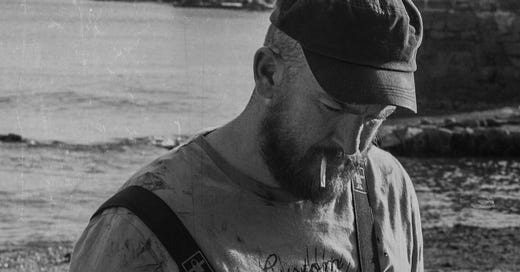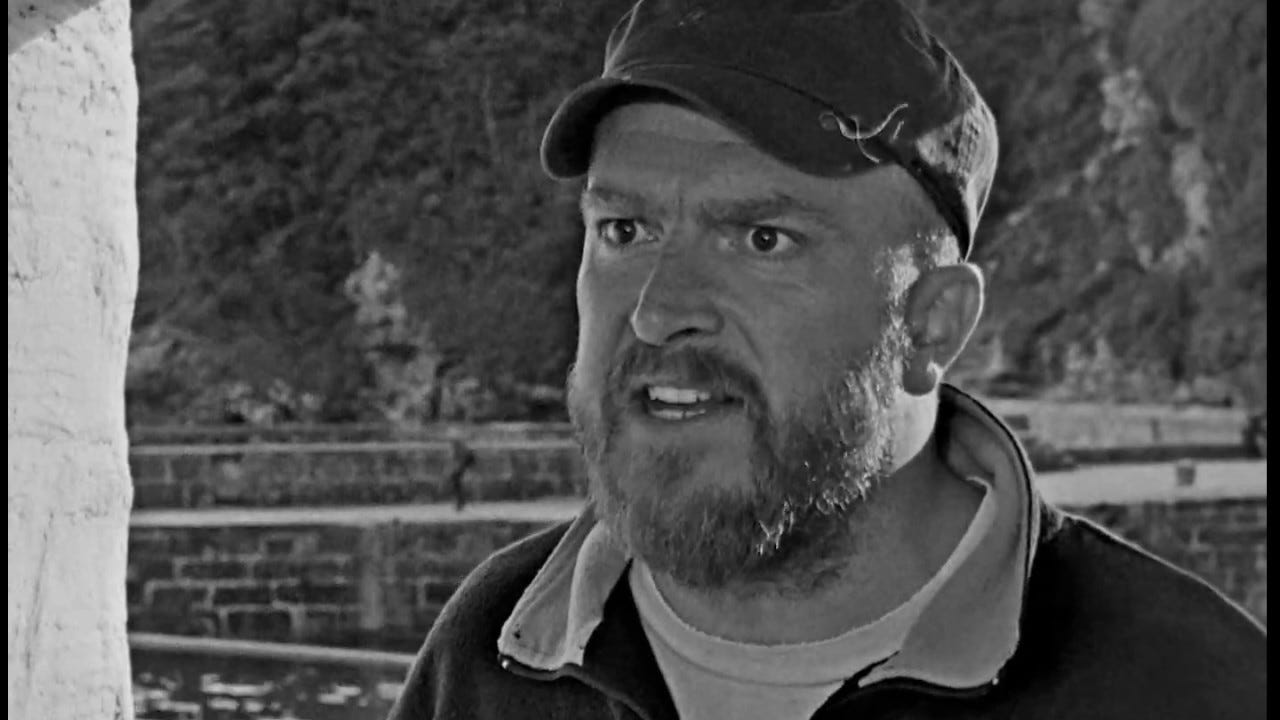Spoilers for Bait (2019)
Mark Jenkin’s Bait is an interesting film, one that veers dangerously close to style over substance, but just about holds onto the viewer with its blunt-force storytelling and naturalistic performances.
Set in a small, Cornish fishing village, it sees tensions rise between Martin (Edward Rowe), a down-on-his-luck fisherman saving to buy a boat, and a family from London who have turned Martin’s childhood home into a summer house and holiday let.
Jenkin shot the film on a clockwork Bolex 16mm camera, giving it a distinctive black-and-white, grainy appearance, and dubbed the sound in post-production. This would seemingly explain the sparse, often rudimentary scripting that prioritises getting the point of each scene across. With verbal storytelling taking a backseat, Jenkin uses quick cuts, time jumps and nautical imagery to visualise the growing tension in the town.
The irony of the film is that both parties need the other. While gentrification is harmful and strips local communities of their uniqueness or adopts it for the benefit of the most affluent, there are bigger reasons hinted at for the village’s downturn in Jenkin’s film. While Martin may not want to admit it, the income that these city-dwellers bring to the village is vital – to the point where the local pub closes when they are not there and his brother Steven has converted their father’s boat to offer pleasure cruises around the bay.
At the same time, those from outside the village want to see the traditional way of life, even if they don’t want to experience the noises and smells which come with it. The holiday let is sold on the fact that it’s situated in a working fishing village. This uncomfortable co-dependency is what fuels the tension.
There’s a moment early in the film which highlights this. Martin enters his old house to speak with Sandra and Tim (Mary Woodvine and Simon Shepherd). The spark that ends up engulfing them is caused by a parking space – Martin needs the space to access the harbour, Sandra and Tim allocate the space for their holiday guests. When Martin goes to speak to them about this, he can see the changes they have made to his home.
He notes the nautical decoration. They’ve used rope and buoys in the living room and placed a porthole in the wall to see into the renovating pantry. To Martin, this represents gentrification of the worst possible kind. While he struggles to afford new fishing equipment, and is currently scraping a living without a boat, they have co-opted the tools of his trade to make their property more appealing to visitors.
When we see Martin’s house later, it has none of the nautical decoration. Nor are there any remnants of this in his brother Steven’s (Giles King) house. Fishing is not a novelty to them.
Yet as the film expands beyond this scene, we see that neither side have the high ground in this fight. While the script might be rough around the edges, Jenkin isn’t content to give us black-and-white characters. Sandra especially appears to have an appreciation of the village, even if this isn’t always obvious. When Steven starts up the boat early one more and a holidaymaker complains about the noise, she points out that it is a working fishing village and that the guest is disturbing more people than the boat.
Towards the end of the film, she even goes to Martin’s house to try and make amends with him. He isn’t home, but when she finds his meagre savings tucked away, Sandra adds some of her own money to it. Perhaps a way of sharing the profits she has made from Martin’s old home.
Sandra’s more understanding side is counteracted by Martin’s belligerence. He belittles his brother for giving up fishing and berates the landlady for closing the pub over winter. When Sandra and Tim’s pompous son Hugo (Jowan Jacobs) heads to the bay in scuba gear and armed with a harpoon gun, Martin doesn’t offer words of encouragement to this out-of-towner, instead he mocks him for even trying to fish, deepening the divide and nurturing bad feelings until the tension reaches a breaking point.
Jenkin, a Cornish native, clearly has no love for the gentrification of his home county, especially when those born and bred in the area struggle to make ends meet. Yet, he never goes as far as to blame the individuals lucky enough to afford property there. His target is the broader political and economic decisions that have impacted local industry. Bait represents the uncomfortable co-dependency that many are forced to rely on.
Writer/director: Mark Jenkin
Starring: Edward Rowe, Mary Woodvine, Simon Shepherd









